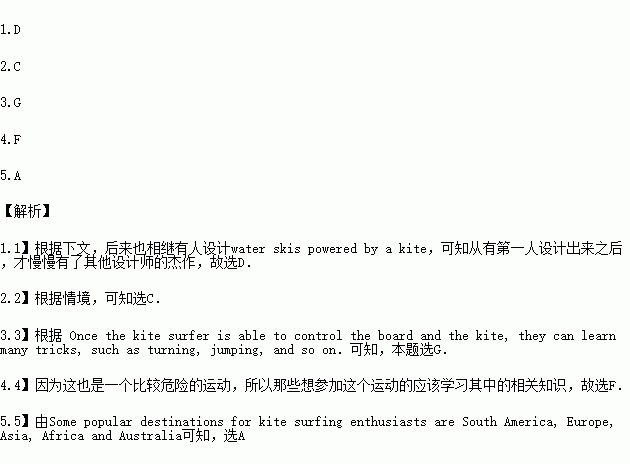题目内容
Who would have thought to put a kite and a surfboard together? It may seem like an impractical idea, but a man named Cory Roeseler from Oregon believed that it would work, and introduced the idea in the 1980s.1. Over the next few years, other designers contributed to the style and shape of the board, resulting in a mixture of kiting and surfing, which is what kite surfing is today.
2. The power kite pulls a small board that is fastened to the surfer’s feet, and there is a harness (安全带) that goes around the surfer’s waist to make sure that the surfer stays connected to the board.The wind determines which direction would be easiest for the surfer to go in.Once the kite surfer is able to control the board and the kite, they can learn many tricks, such as turning, jumping, and so on. 3.
This sport can sometimes be potentially dangerous to other kite surfers, beachgoers, and the kite surfers themselves if they don’t know how the proper procedure is done.4. They can learn the techniques safely without putting themselves and others in danger.A good course should include basic operations, kite set-up, maintenance (维修) of equipment, weather planning, and emergency landings.These courses are available in almost all areas where kite surfing is popular.
5. Some popular destinations for kite surfing enthusiasts are South America, Europe, Asia, Africa and Australia, but wherever there is wind, there will be kite surfers.You might even be able to see kite surfers on the beach closest you!
A.Kite surfing has become a mainstream sport.
B.Kite surfing is a difficult and dangerous sport.
C.The way it works is an application of simple physics.
D.The first design was with water skis powered by a kite.
E.It is also known as kite boarding, and in some European countries as fly surfing.
F.Therefore, it is highly recommended that people who want to participate in this sport attend a
course.
G.With the combination of the wind and the ocean, some kite surfers can go at top speeds while
flying over 20 feet in the air.
 英语小英雄天天默写系列答案
英语小英雄天天默写系列答案 暑假作业安徽少年儿童出版社系列答案
暑假作业安徽少年儿童出版社系列答案
